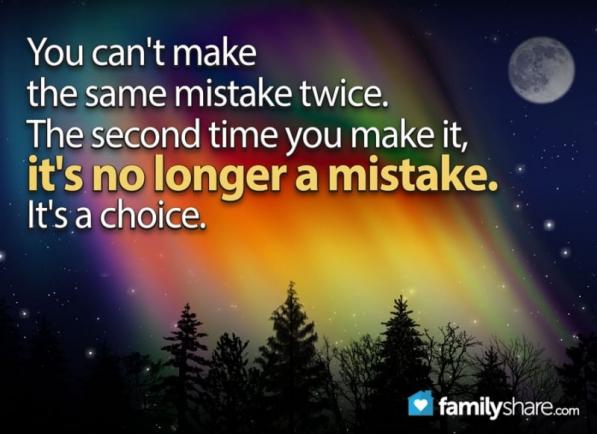
I saw a cartoon the other day that said, "Divorce is like algebra. You look at your X and ask Y?"
When I ask people going through a divorce what they might do differently next time, the first response I normally get is, "Not marry him (or her) in the first place!"� Humor is good. Divorce is such a stressful, sad time, that a little laughter goes a long way and is so good for the soul. It reduces anxiety and stress. But, underlying that question is a serious request for which I am seeking an honest answer.
Mahatma Gandhi
said, "It is wrong and immoral to seek to escape the consequences of one's acts."�
So often we hear the term accountable when it comes to the other person in our divorce. We hear, "He must be held accountable for his affair,"� or "She needs to be held accountable for drinking too much."� What about our own personal accountability?
It is much easier to place blame on others, and say that all of the accountability lies with them. I get that. Trust me, I do. But, we also owe it to ourselves to turn that mirror around and find out what piece of personal accountability we each own.
Introspection
I have often said that if you go through a divorce, even if you didn't do anything wrong (that's loosely defined), you still owe it to yourself to become introspective and ask what you might have done differently. If we don't ask this question of ourselves, how are we going to become even better as individuals, even better in other personal relationships, and even better in any future romantic relationships, marriages or partnerships? What can we learn about what we went through that will make us a better person as we move on in life?
For some people, that introspection will result in a realization that they didn't give priority to their spouse. It might be a realization that everyone else came first (work, the kids, the parents, the friends, the hobbies ... always expecting that the spouse would wait patiently).
It might be an awareness that you stopped letting little things that were cute when you were first married remain little things, and instead allowed that to become big items which led to rolling of the eyes, incessant nagging, and fights.
It might be an understanding that you grew tired of being the one who was always trying and that you ultimately just gave up and stopped expending the energy and the oxygen that your marriage needed to survive.
It could be that you quit taking care of yourself, that you quit trying to be healthy, that you quit trying to impress your spouse like you did when you were first dating or first married, and just expected them to understand.
Inventory
My request today is to challenge each of us to question our own actions and find out what we are responsible for and what we can hold ourselves personally accountable for. You don't have to share this with others; just be sure to be honest with yourself about what you might have done differently or what you will be sure to do differently going forward.
I'm not saying this is easy to do. In fact, it can be quite difficult to do, especially if you don't feel you had any blame in your divorce. I hear people say, "I wasn't the one who cheated. I wasn't the one who squandered all of our money. I wasn't the one who decided I didn't want kids. I wasn't the one who changed."� Then they say, "So I'm not accountable in any way, shape or form for my divorce."� Maybe - and maybe not.
Progress
I argue, we can all learn a thing or two about who we are, what makes us tick, and what role we might have played in being part of a failing marriage. Accountability isn't about personal blame or about tearing ourselves apart. It is about taking a life experience and learning from it. If you don't learn from your own mistakes, you will keep making them. Turning that mirror around and discovering your own personal accountability is only part of it. It answers the who and the what; you still need to ask yourself, so what? So what now? So what will I do differently? So what have I learned about myself?
Personal growth comes from turning that mirror around, taking a deep look at yourself, accepting what you see at face value, and then doing something differently with that learning.
What do you think? What might you do differently next time? What is your, so what?

